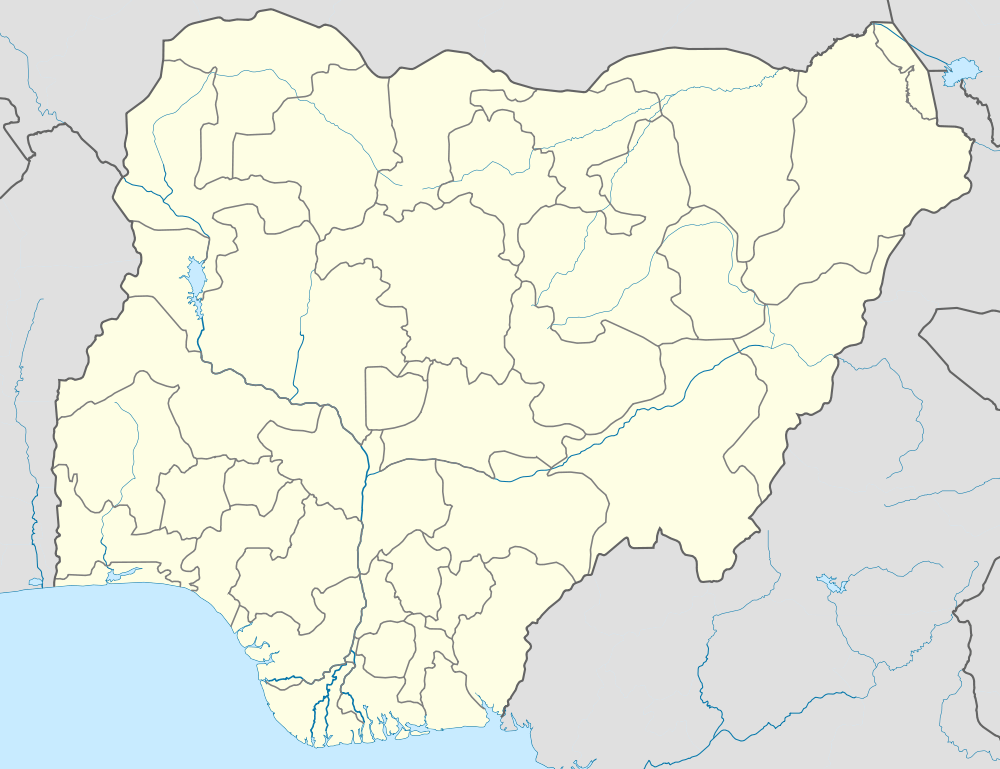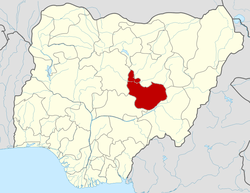Wase, Nigeria
| Wase | |
|---|---|
| LGA and town | |
 Wase | |
| Coordinates: 9°6′N 9°58′E / 9.100°N 9.967°E | |
| Country | Nigeria |
| State | Plateau State |
| Area | |
| • Land | 680 sq mi (1,750 km2) |
| Time zone | WAT (UTC+1) |
Wase is a town and Local Government Area (LGA) of Plateau State, Nigeria. Situated some 216 km south east of Jos, the Plateau State capital, Wase State is a traditional state founded in the area in 1820; this became part of the British Royal Niger Company protectorate (later Northern Nigeria) in 1898. The population of the LGA was 125,000 people as of 2003, and the area is 1750 km².
Location
Bashar is a town next to Wase among the districts in terms of population, political background and leadership. Other notable towns and villages include Lamba, Saluwe, Mavo, Wase-Tofa, etc.
A unique feature of Wase is the famous Wase Rock. It is perhaps the most outstanding and breath-taking sight in Nigeria, in terms of rock formations. This beautiful topographic feature stands alone, and rises sharply at well over 800 ft (250 m), like an imposing skyscraper, above the surrounding Wase plain. The rock is also surrounded by the Wase Game Reserve/ Bird Sanctuary and serves as one of the rare breeding places of the White Pelican birds in Africa. The rock is a mountaineers' delight and a must-visit for bird watching and picnics.
Another feature is the Wase River, which runs through the LGA. It serves as a major water source for both irrigation and the domestic use of the local communities.
The Boghom language is spoken in Bashar NGA.[1]
Local government council
The main tribal group in the local council are the Fulani ruled by an Emir who doubles as the chairman of the local emirate council. The Tarok tribe also forms a significant population in Wase Local government council. There are only two emirate councils in Plateau state, the other is Kanam. Emirs are selected by a council of seven kingmakers. The 13th Emir of Wase was Alhaji (Dr.) Haruna Abdullahi Maikano. He was nominated three months after the death of his father in September 2001, but was not confirmed until a year later.[2] He was assisted by the Rekna of Bashar, Alh. Adamu Idris, in conducting the affairs of the traditional council. who control the traditional council in the absence of the emir. Haruna Abdullah died in September 2010 at the age of 64.[3] Alh Dr Muhammadu Sambo Haruna replaced late Dr Haruna Abdullah as the 14th Emir of Wase with effect from 28 October 2010.[4]
The Wase Emirate Council consists of four districts, namely: Wase, Bashar, Lamba, and Kadarko. Each of these districts is headed by a district head known as the "Hakimi", while the several towns and villages in the districts are headed by a chief known as "Sarki". At the moment, the Rekna of Bashar is the oldest paramount traditional ruler, having spent forty-nine years on the throne. Due to his advanced age, he is currently being assisted by his son, Yusuf Adamu Idris, who is currently working with the Nigeria customs service in conducting the affairs of Bashar.
References
- ↑ Boghom at Ethnologue
- ↑ "Nigeria: Six Eye Wase Emir's Throne". Daily Trust. 23 September 2010. Retrieved 2012-03-24.
- ↑ GONJI PALANG (18 September 2010). "Nigeria: Emir of Wase Dies at 64". Leadership (Abuja). Retrieved 2012-03-24.
- ↑ MAHMUD LALO (29 October 2010). "Nigeria: Wase Gets New Emir". Daily Trust. Retrieved 2012-03-24.
Coordinates: 9°06′N 9°58′E / 9.100°N 9.967°E
| |||||||||||||
